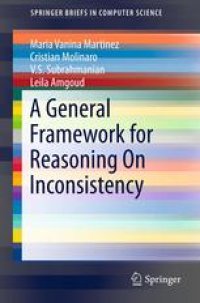
Ebook: A General Framework for Reasoning On Inconsistency
- Tags: Artificial Intelligence (incl. Robotics), Database Management, Logics and Meanings of Programs, Data Mining and Knowledge Discovery, Mathematical Logic and Formal Languages
- Series: SpringerBriefs in Computer Science
- Year: 2013
- Publisher: Springer-Verlag New York
- Edition: 1
- Language: English
- pdf
This SpringerBrief proposes a general framework for reasoning about inconsistency in a wide variety of logics, including inconsistency resolution methods that have not yet been studied. The proposed framework allows users to specify preferences on how to resolve inconsistency when there are multiple ways to do so. This empowers users to resolve inconsistency in data leveraging both their detailed knowledge of the data as well as their application needs. The brief shows that the framework is well-suited to handle inconsistency in several logics, and provides algorithms to compute preferred options. Finally, the brief shows that the framework not only captures several existing works, but also supports reasoning about inconsistency in several logics for which no such methods exist today.
This SpringerBrief proposes a general framework for reasoning about inconsistency in a wide variety of logics, including inconsistency resolution methods that have not yet been studied. The proposed framework allows users to specify preferences on how to resolve inconsistency when there are multiple ways to do so. This empowers users to resolve inconsistency in data leveraging both their detailed knowledge of the data as well as their application needs. The brief shows that the framework is well-suited to handle inconsistency in several logics, and provides algorithms to compute preferred options. Finally, the brief shows that the framework not only captures several existing works, but also supports reasoning about inconsistency in several logics for which no such methods exist today.
This SpringerBrief proposes a general framework for reasoning about inconsistency in a wide variety of logics, including inconsistency resolution methods that have not yet been studied. The proposed framework allows users to specify preferences on how to resolve inconsistency when there are multiple ways to do so. This empowers users to resolve inconsistency in data leveraging both their detailed knowledge of the data as well as their application needs. The brief shows that the framework is well-suited to handle inconsistency in several logics, and provides algorithms to compute preferred options. Finally, the brief shows that the framework not only captures several existing works, but also supports reasoning about inconsistency in several logics for which no such methods exist today.
Content:
Front Matter....Pages i-vii
Introduction and Preliminary Concepts....Pages 1-4
A General Framework for Handling Inconsistency....Pages 5-11
Algorithms....Pages 13-20
Handling Inconsistency in Monotonic Logics....Pages 21-33
Link with Existing Approaches....Pages 35-40
Conclusions....Pages 41-42
Back Matter....Pages 43-45
This SpringerBrief proposes a general framework for reasoning about inconsistency in a wide variety of logics, including inconsistency resolution methods that have not yet been studied. The proposed framework allows users to specify preferences on how to resolve inconsistency when there are multiple ways to do so. This empowers users to resolve inconsistency in data leveraging both their detailed knowledge of the data as well as their application needs. The brief shows that the framework is well-suited to handle inconsistency in several logics, and provides algorithms to compute preferred options. Finally, the brief shows that the framework not only captures several existing works, but also supports reasoning about inconsistency in several logics for which no such methods exist today.
Content:
Front Matter....Pages i-vii
Introduction and Preliminary Concepts....Pages 1-4
A General Framework for Handling Inconsistency....Pages 5-11
Algorithms....Pages 13-20
Handling Inconsistency in Monotonic Logics....Pages 21-33
Link with Existing Approaches....Pages 35-40
Conclusions....Pages 41-42
Back Matter....Pages 43-45
....